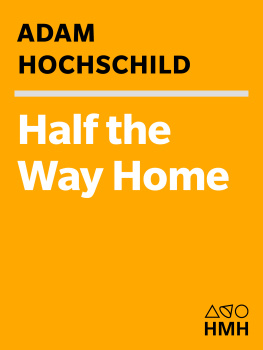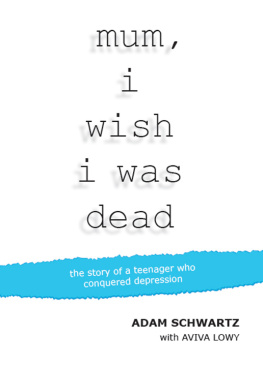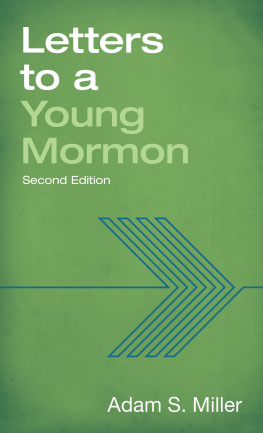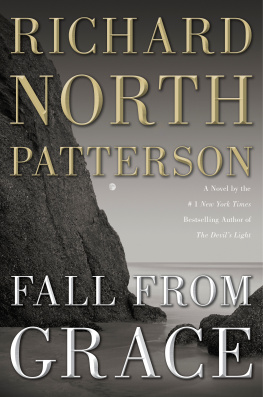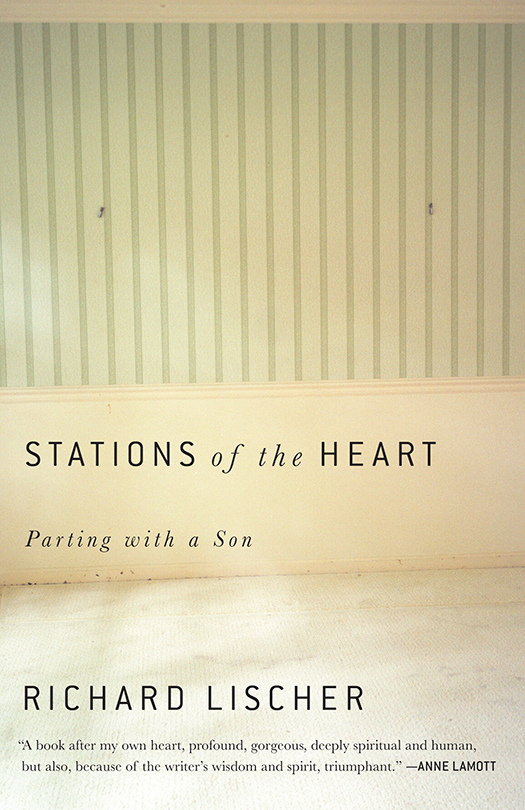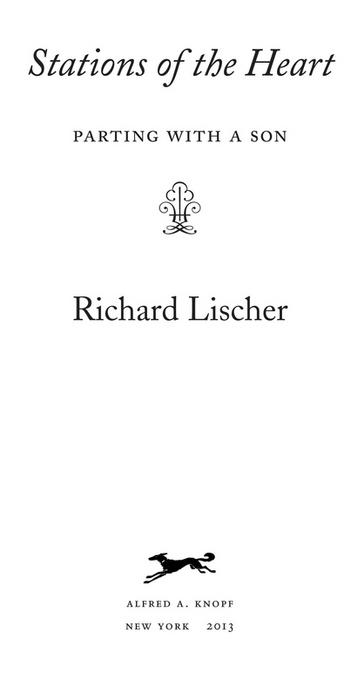THIS IS A BORZOI BOOK
PUBLISHED BY ALFRED A. KNOPF
Copyright 2013 by Richard Lischer
All rights reserved. Published in the United States by Alfred A. Knopf, a division of Random House, Inc., New York, and in Canada by Random House of Canada, Limited, Toronto.
www.aaknopf.com
Knopf, Borzoi Books, and the colophon are registered trademarks of Random House, Inc.
constitutes an extension of this page.
Library of Congress Cataloging-in-Publication Data is available.
eISBN: 978-0-307-96054-2
Cover design by Linda Huang
Cover photograph Beth Chucker
v3.1_r2
FOR
Jenny and Elizabeth
Tracy and Sarah
something understood
Contents
What is elegy but the attempt
To rebreathe life
Into what the gone one once was
Before he grew to enormity.
Come on stage and be yourself,
The elegist says to the dead. Show them
Nowafter the fact
What you were meant to be:
The performer of a live song.
A shoe. Now bow.
What is left but this:
The compulsion to tell.
MARY JO BANG,
from The Role of Elegy
The Fountain

1
S even years ago, on the thirteenth day of April, my son called to tell me his cancer had returned. He was a grown man, but he told me his news like a boy. He said, Hey, Dad, wheres Mom? You would have thought he had just put a dent in the familys new car or failed a final exam. He might have been in a little trouble and wanted his mother to buffer the rough edges. He said they had found tumors in quite a few places in his body, on his liver, chest, side, and more. Then he asked me to come to him. And that was all.
I was not expecting the call. But then you never are. You are never adequately braced with feet planted and stomach muscles clenched. Just when you should have been steely-eyed, you were caught looking away, distracted by a passing thought, and now it is too late. A police car with its rotating blue lightwhy in my driveway? An envelope marked Personal from someone you dont know. A stranger in uniform who doesnt say hello, but asks you who you are and where you live.
A phone call from your son.
A familiar voice emerges from a piece of inexpensive black plastic. The voice has no body, and yet it makes a claim as firm and authoritative as flesh. It says Hey, Dad with an end stress on Dad that has always and in every circumstance meant trouble. Hey, Dad, and ordinary time stands still and the room begins to turn while you wait for the rest of the sentence to do its work. Why dont you come over to 2 K, it says. The ruin in his voice becomes the new truth in your life, and your old life, the only one you have ever known or wanted, simply vanishes.
We addressed each other with an economy of passion, as men will do when they are trying to curtail a feeling, as if what had just passed between us was a new piece of information and not a revelation. We spoke as if the end of the ages had not yet come upon us. I do remember later that evening sobbing into the bedroom wall and hitting it hard with my fist. It is a robbery! I cried. But at the moment of his call, there was shockingly little to say. Our brief conversation left no room for misunderstanding and no remainder of options to be sorted out later. I pressed End on my cell phone and began to make my way from the first floor of the hospital to the clinics in an adjoining building.
Even as I was running down corridors, weaving around gurneys, and fumbling with my cell phone to call my wife, something new and forbidden was forming in my imagination. My eyes had begun to burn with a future I was never intended to see. In an ordered world, beginnings and endings are off-limits. A parent is not designed to comprehend the childs life in its entirety, any more than the child is meant to experience the parents early days or youthful indiscretions. It is a sensible arrangement. Children are not permitted to witness the passions that produced them, and parents are not allowed to observe their childrens final hours.
It follows that a father has no business writing a book about his sons death. This is proper work for sons, perhaps when they themselves are graying and secure in the worldto sum up, round off, and memorialize their fathers. These sons write out of a profound sense of duty toward the generation that preceded them and formed them.
With me it is different. My son has become one of the fathers to me.
When I survey my dad, he is always old; he appears as solid and factual as history. But when I steal a glance at my son, what I feel is closer to enchantment, which is a more complicated subject than history, and more compelling. When I look over my shoulder expecting to face the stable and monumental figure of my father, I see an open-faced boy smiling back at me.
He was so young and inexperienced he thought he had discovered a new way to die. All my wife and I could do was keep him company and follow him on what he somewhat dramatically called his new path. His new way, which was actually a very old way, carried him beyond the stars to the very origins of his universe and to the source of everything he loved. We traveled the path with him, but at a respectful distance behind him, learning from him and trusting him to show us the way. The last leg of his trip took him exactly ninety-five days. We never imagined how much grace would be required for so brief a journey. Now we rely on it every day.
It wasnt until he got sick that I walked the Stations of the Cross for the first time. Until then, I had never thought of them as anything other than a ritual for pious Catholics and a few venturesome Protestants. But as his illness wore on, the Stations began to loom in my imagination, perhaps because cancer itself leads you from one obligatory shrine to the next. It is a disease that teaches incrementally.
In most churches the Stations are so graphic in their depiction of Jesus suffering that they leave little to the imagination: he staggers, he falls, he bleeds, he dies. The ribs protrude from his corpse like piano keys. This is what a young mans death looks like. A few summers ago, when I was teaching at Saint Johns University in Minnesota, I noticed something different about the Stations in the abbey church. They were nothing more than plain crosses cut into the granite pavement. They were not designed to restrict the imagination but to expand it and make it more inclusive. When you stand or kneel on one of these cross-shaped slits, as brutal in their own way as the medieval gore they were meant to replace, they remind you that anyones pain, including your own, can find a place in something larger than itself.
It all begins with the Stations. You have to make every last one of them. You have to go with him for his labs and scans, hang out in the coffee shops, walk the dogs, listen to the same old stories, share the same old jokes, and carry on with him for hours about nothing in particular. And when things get serious, you have to keep your part of the bargain and try not to cry. When he wants to talk about God, you have to hide your own damaged faith, clear your palate of clichs, and find a witness deep within yourself.
Some pretending is involved. You have to nod sagely when he says, Time is irrelevant, even when you have secretly begun to date your own life from a single telephone call. You have to pretend that you are not counting out his days like silver dollars.



